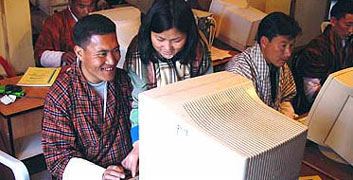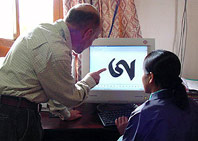|
Education:
Information and Communication Technology (ICT) |
 |
Bhutan's
Education ICT |
|
 |
Bhutan
ICT |
|
|
 |
|
Forum
on ICT in Thimphu 2006 |
 |
75
students from Thimphu schools gathered in a forum to express views on how
information and communication technology (ICT) can shape Bhutan they had
a lot to say.
 |
Dzongkha teachers
The
students talked about the digital divide, ICT and education, employment
and health and as a facilitator in the democratic process.
"ICT
in education should be understood as an application of digital equipment
to all aspects of teaching and learning," said a Class XII student Chador
Tshomo. "It needs to enter our classrooms and become a part of our teaching
learning process." |
|
She
pointed that ICT could enhance the quality of education which, today, was
being debated upon.
"In
the present situation, our classrooms are overcrowded, teaching and learning
resources are limited, reference materials are scarce, method of instruction
is through chalk and black board and student learning materials are confined
to the textbook," said the Class XII student.
It
is an established fact that classroom learning in Bhutan is obstructed
by a shortage of qualified teachers and accessibility to information and
support outside the classroom.
Two
things became clear at the forum; that ICT had not entered Bhutanese classrooms
as much as it ought to and the digital divide among the Bhutanese youth
was getting wider.
While
the 75 students present at the forum all agreed to have heard and seen
computers, only four had used it and even less had email accounts. Majority
of the students did not have access to computers, whether at home, schools
or elsewhere.
The
Department of Information Technology's (DIT) deputy director, Sangay Wangchuk,
agreed that the wind of ICT revolution sweeping across the world was barely
brushing Bhutanese youth.
 |
| Dzongkha teachers |
| "Despite
knowing the benefits there has not been much ICT impetus in this sector,"
he told Kuensel. Accessibility was scarce and the focus of providing facility
and connectivity was vague. Students
like Jambay Sherub and Tashi Phuntsho get to 'use' computers once a week
in school. They said they had not used the Internet because they could
not afford to go to the Internet cafés.
|
|
If
this is the situation in the capital the picture in the districts would
definitely be worse. For example, the only Internet cafe in urban Trashigang
was shutdown in 2004 because there were no users.
First
of all students found it too expensive and the connectivity was very slow
and unreliable. In many other urban centres in the districts, this business
is yet to be started. "There exists a high degree of disparity with regard
to ICT and students," said the vice principal of Rinchen Higher Secondary
School Chogyal Tenzin. "Some are fully exposed to it while others have
not even touched it, and it differs from school to school."
But
a majority did not have the access, which denied them the resources to
enhance learning not only in schools but also away from it, he said.
Few
schools that had Internet connectivity had the facility available only
for the head of the school and, on few occasions, for teachers. For students
Internet facilities, in most schools across the country, were off-limits.
In
an effort to bridge the digital divide, last year, the DIT supplied 300
computers to 100 primary schools across the country. But according to a
spokesperson for DIT, connectivity (Internet) was still lacking while many
schools did not have electricity and telephone connections.
Also
to promote ICT in schools, Bhutan Telecom is providing Internet connections
on dialup packages at 50 percent discount to all schools. Besides, through
a memorandum of understanding with education ministry, Bhutan Telecom provided
free 'weekend' Internet connectivity in 10 schools picked by the ministry
from across the country.
The
UNESCO Information and Communication Technologies in Teacher Education
(2002) points out the emergence of new paradigm of teaching-learning process
with a shift from teacher-centred instruction to learner-centred instruction
that was needed to enable students to acquire the new 21st century knowledge
and skills.
This
new shift professed learning as a natural process where ICT provides opportunities
for teachers and students to collaborate with others across the country
and across the globe. They also provide new tools to support this collaborative
learning in the classroom and online.
top
But
studies have also shown that the daily ordeal of dull and ritualistically
solitary classroom activity of traditional teaching-learning process was
much more preferred in the wake of risk that children are exposed to on
the world wide web.
The
porn industry has built the Internet and today it was the only successful
e-business growing at 40 percent annually since 1997.
A
London School of Economics study that surveyed 1,511 youth aged nine to
19 years suggests that 57 percent had seen net porn.
Plagiarism,
evaluating the authenticity and difficulty in sorting through the information
were some of the other concerns of using the web as a tool to supplement
education.
Often,
Bhutanese school children sought help from elders on out-of-classroom assignments
and project works and which were, often, copy-paste from the online source.
Taking
this into consideration, another student Thujee P. Lhendup said it would
not be wise to altogether forgo the chalk and blackboard system of teaching-learning.
But he agreed that schools should apply more of ICT in the process.
Flashing
cell phones, i-pods, and chatting online would sum up how Bhutanese youth
today apply information and communication technology (ICT).
A
majority, though, are more accustomed to online games. Most of the Internet
cafés in Thimphu city have been changed into video-game parlours
and are doing sound business.
| Contributed
by Bishal Rai, KUENSEL, Bhutan's National Newspaper, 2006 |
 |
top
|
Information
|

|
|
Links
|

|
 |
 |
External
links |
|




